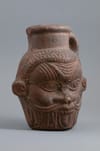Morocco, Brazil bolster economic ties
The LIDE Brazil-Morocco Forum in Marrakech, held on Wednesday, brought together more than 100 business leaders, policymakers, and institutional representatives

Researchers have uncovered chemical evidence suggesting that ancient Egyptians used hallucinogenic substances, possibly in fertility rituals, according an article in the New York Times, citing a paper from Dr Branko van Oppen de Ruiter in the journal Scientific Reports. The discovery came from a second-century B.C. ceramic mug featuring the face of Bes, a god associated with fertility and revelry.
Analysis of the mug revealed traces of hallucinogenic plants, including Syrian rue and blue water lily, along with fermented fruit alcohol, pine nuts, honey, and licorice. Strikingly, human bodily fluids like breast milk and blood were also present, suggesting the concoction was used in magical or ritualistic contexts rather than for everyday purposes.
The mug likely played a role in “incubation” rites, where women hoping to conceive drank the potion to induce vivid visions and perhaps gain the god’s favor. The findings add to growing evidence that ancient Mediterranean cultures were familiar with psychedelics, echoing practices seen in Mesoamerican civilizations.
Sign up for the weekly newsletter and get our latest stories delivered straight to your inbox.